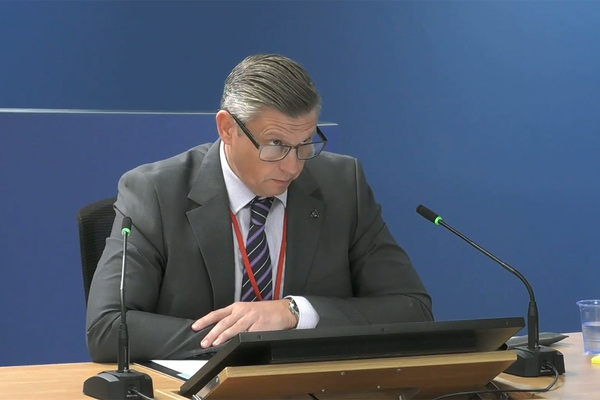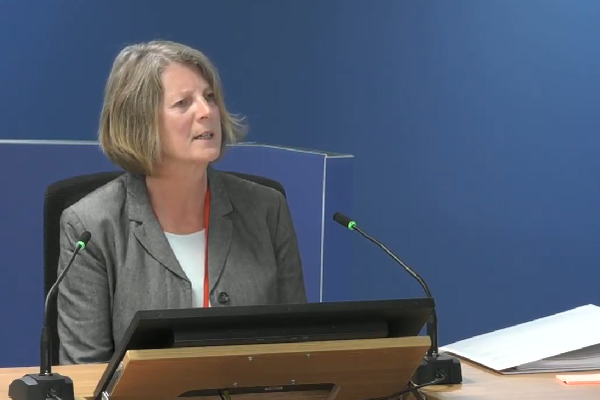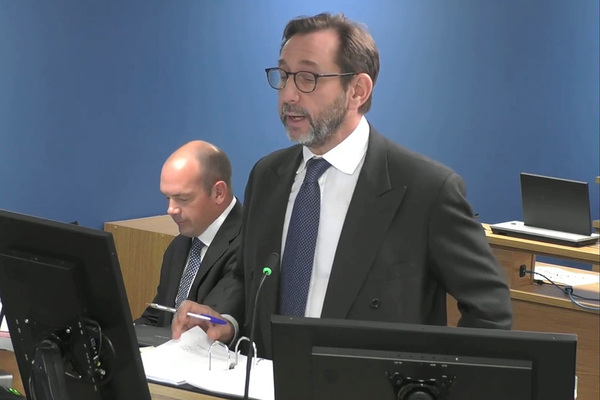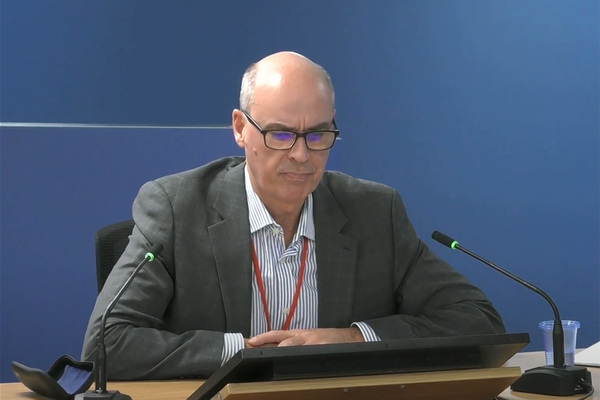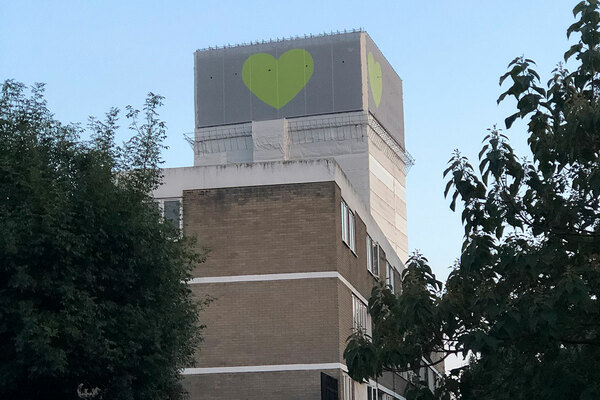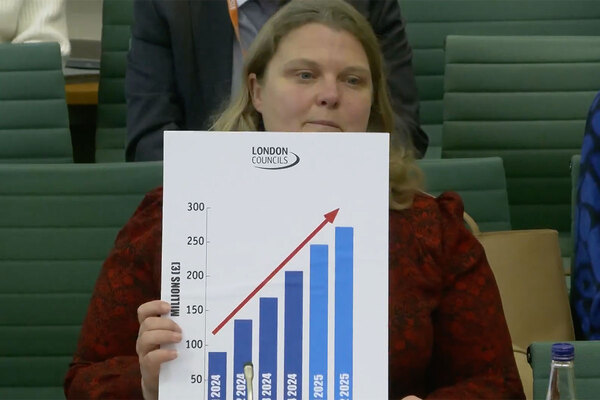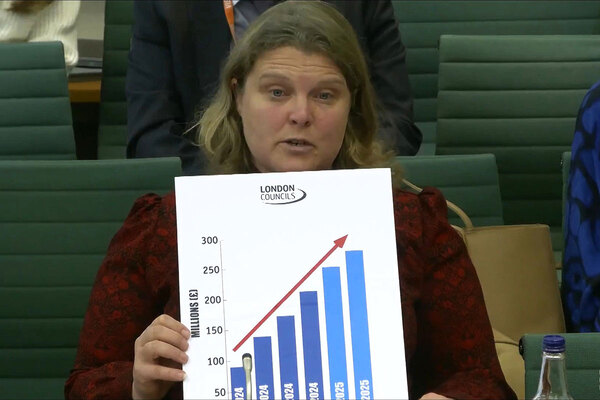Grenfell Tower Inquiry diary week 14: ‘Did it not occur to you at this point that your budget was simply too low?’
This week, for the first time in phase two, the inquiry heard from Kensington & Chelsea Tenant Management Organisation (KCTMO), the managing agent that oversaw the fatal refurbishment of Grenfell Tower. Lucie Heath reports
What was KCTMO’s role?
KCTMO was the wholly owned company set up in 1996 to manage the Royal Borough of Kensington and Chelsea (RBKC)’s housing stock.
During Grenfell’s refurbishment, KCTMO acted as the client. It was therefore responsible for deciding the scope of the work, setting the budget and hiring contractors.
RBKC terminated its contract with KCTMO following the fire at Grenfell and KCTMO now only exists as a legal entity to represent itself at the inquiry.
Here’s what we learned from the first week of KCTMO’s evidence:
‘This was the first project where we were given the opportunity to carry out this type of work’
Questions were raised this week about whether KCTMO had the level of skills and experience necessary to carry out a project as big and complex as Grenfell’s refurbishment.
David Gibson, who was KCTMO’s head of capital investment between 2013 and 2016, told the inquiry he believed Grenfell was the first time KCTMO was “given the opportunity to carry out this type of work on [RBKC’s] behalf”. Before Grenfell, KCTMO had only carried out “relatively minor works”, while RBKC remained responsible for “major capital works”, Mr Gibson said.
His evidence was backed up by Mark Anderson, KCTMO’s director of assets and regeneration from 2011 until early 2013. Mr Anderson said during his time at the organisation, KCTMO had been “going through a degree of change”. This partly involved trying to “do more for RBKC”.
Both witnesses raised concerns about KCTMO’s skill levels. Mr Anderson said that when he joined the TMO – which was not long before early work on Grenfell’s refurbishment began – the property services department “hadn’t been performing to the standards that either KCTMO or RBKC wanted”. He said the department had failed “over a number of years” to deliver KCTMO’s capital investment programme, which involved the maintenance of existing housing stock.
Mr Gibson said that when he joined KCTMO, he had been concerned his team’s project managers were “lacking experience”, adding that it was very difficult to find suitable people for these types of roles in the industry at the time.

‘There is clearly an established lack of communication from the KCTMO’
It was not just KCTMO’s lack of experience of carrying out major works that raised concerns with regards to their ability to oversee the Grenfell refurbishment – the organisation was also criticised throughout the project for failing to communicate effectively with residents.
This week, the inquiry was shown several letters sent to the organisation by the Grenfell Tower Leaseholders Association (GTLA), complaining about several issues related to “an established lack of communication from the KCTMO”. In one letter, the GTLA complained that Grenfell tenants had been told their fire doors needed to be upgraded following a fire risk assessment (FRA) 19 months before individual leaseholders were made aware of the issue.
The letter read: “The leaseholders of Grenfell Tower are not immune from fire risk. We find this matter inhuman on your behalf in relation to your lack of communication to leaseholders.”
On Monday, the inquiry heard that Paul Dunkerton, who was a project manager at KCTMO until mid-2013, took more than a month to respond to subsequent queries from the GTLA about whether it needed to replace their fire doors.
When he did reply, he told the GTLA a subsequent review of the FRA found “none of the properties at Grenfell Tower are highlighted as having ‘potentially non-compliant’ entrance doors”.
However, the first phase of the Grenfell Inquiry found that faulty fire doors contributed to the fatal spread of smoke throughout the tower on the night of the fire.
The inquiry was also shown an internal email in which Mr Dunkerton labelled two Grenfell residents “the main antagonists on the Lancaster West Estate”, which is where the Grenfell Tower was situated, after one of the residents had asked for an update on the project’s planning application.
When asked why he chose to describe the residents as “antagonists”, Mr Dunkerton said: “My choice of words wasn’t great, but they were more vocal than other residents or leaseholders in the tower.”
‘Did it not occur to you at this point… that your budget… was simply too low?’
Richard Millet QC asked Mr Gibson if by “offline meeting”, he meant “it was a secret meeting and therefore should be unrecorded” (picture: Grenfell Inquiry)
From previous weeks’ evidence, we already know that Rydon discussed cost-cutting measures with KCTMO before officially being awarded the contract for the refurbishment. This week, we further explored the procurement process from KCTMO’s perspective.
Mr Gibson told the inquiry that the organisation faced a “problem” once tender-bidding for the Grenfell refurbishment had closed: all bidders had quoted higher than the £8.4m KTCMO had allocated for the project.
At £9.2m, Rydon’s bid was much lower than the other two bidders – and £800,000 less than that estimated by the TMO’s advisers. However, KCTMO wanted to make a further £800,000 in savings.
The organisation therefore tried to find out whether it could enter into a contract with Rydon without having to commit to its bid. The legal advice it received stated that it would be a breach of EU regulations “to undertake negotiations with the tenderers prior to contract award” or “for tenderers to submit revised best and final offers”.
It added: “Your only EU-compliant options are to assess the tenders and award the contract to the tenderer who scored the highest based on your price/quality criteria… If the contract allows it, you may run value engineering exercises with your selected tenderer, but only once the contract has been entered into.”
“I think that we were actually quite pleased when we saw the Rydon tender submission figures, because it wasn’t as big of a gap as we thought there might be”
Following this advice, Mr Gibson told the inquiry KCTMO arranged an “offline” meeting with Rydon to discuss value engineering options. He said the purpose of the meeting was “for us to be comfortable and for them to be comfortable with our approach to overcome the problem”.
Richard Millet QC asked Mr Gibson if by “offline meeting”, he meant “it was a secret meeting and therefore should be unrecorded”.
Mr Gibson replied: “Yes.”
“Did it not occur to you at this point… that your budget, the £8.415m odd, was simply too low for the project that you wanted?” Mr Millet asked during further cross-examination.
“No,” replied Mr Gibson. “I think that we were actually quite pleased when we saw the Rydon tender submission figures, because it wasn’t as big of a gap as we thought there might be and we thought: ‘This is something that we can make work.’”
The inquiry was also shown minutes from a KCTMO board meeting that revealed a member of the organisation’s board had queried why Rydon’s budget was so low compared to the other bidders’, questioning whether Rydon had put in a low bid simply to win the contract. However, the board was assured Rydon submitted “a very detailed tender report which was also competitive”. It’s unclear whether the board was told about the “offline” discussions with the contractor.
‘With all due respect, it was an obvious question then: have you been involved in cladding a high-rise residential building?’
Mark Anderson insisted he properly investigated architect Studio E’s experience and interviewed its director several times (picture: Grenfell Inquiry)
The contracting of Rydon was not the only aspect of KCTMO’s approach to procurement that was queried. This week, it was also grilled on how it appointed an architect.
We already knew that KCTMO did not undertake its own procurement exercise to hire architect Studio E, instead depending on the one RBKC had undertaken for a project involving a neighbouring school and leisure centre. Mr Anderson told the inquiry RBKC gave it conflicting advice about whether it could use the same architect for Grenfell, but the council ultimately told it that doing so was within the rules.
The problem with this was it prevented KCTMO from searching for an architect with suitable experience for Grenfell. Studio E’s director has previously admitted to the inquiry that the firm wouldn’t have won the contract if it went to open tender as it had not had the requisite experience.
Under cross-examination, Mr Anderson insisted he properly investigated Studio E’s experience and interviewed its director several times. However, he admitted he never asked anyone at Studio E whether they had experience overcladding a high-rise residential building.
“Why not? It’s an obvious question, isn’t it?” asked Andrew Kinnier QC.
“It is now,” replied Mr Anderson. “I don’t know why I didn’t ask that question.”
“With all due respect, Mr Anderson, it was an obvious question then. ‘Have you been involved in cladding a high-rise residential building?’ That’s what you’re asking them to do,” said Mr Kinnier.
Mr Anderson replied: “At that stage, the type of cladding had not been determined. The questions that were being asked of Studio E… was: ‘Have you done residential refurbishment projects?’ And the response to that was that they hadn’t as a practice, but individuals involved within the practice had done that.”
Interestingly, Mr Anderson and Mr Gibson are fully qualified architects. During their evidence sessions, counsel repeatedly asked them what responsibility they had as “informed” clients to monitor the work of those they employed and question the decisions that were being made.
An example of this came when Mr Gibson was grilled on the decision to switch from zinc cladding to the cheaper aluminium composite material (ACM) panels.
“He said Mr Lawrence assured him the cladding was ‘inert’ and ‘would not burn at all’”
Mr Gibson said that despite not knowing what ACM was when it was suggested as an alternative to zinc, he only asked questions about the “cost” and “appearance” of the cladding.
“The discussions we were having were: what does it look like, is it acceptable for planners and what’s the cost?” he told Mr Millet.
He added: “Discussions weren’t any further than that because we weren’t expecting to be offered anything that might not be compliant.”
However, Mr Gibson claimed he did later raise questions around the fire performance of ACM during the construction phase after he was surprised to learn that there was a gap between the cladding and the insulation.
According to Mr Gibson, this prompted him to ask Simon Lawrence, contracts manager at Rydon, whether the cladding was safe, having recently read about the Lakanal House fire that killed six people in 2009.
He said Mr Lawrence assured him the cladding was “inert” and “would not burn at all” – Mr Lawrence had denied this when he gave evidence to the inquiry.
When asked about the incident this week, Mr Gibson remained adamant that Mr Lawrence had given him assurances, despite nobody being able to find written evidence of the meeting in which Mr Gibson claims the conversation took place. He said there was “a whole series of meetings” that took place at that time for which nobody can find the minutes.
When asked by Mr Millet whether there was anything that he thinks he should have done differently looking back on the Grenfell refurbishment, Mr Gibson replied: “With the benefit of hindsight, when I raised the query about the installation and got the assurance I received, I would have liked to have followed that up.”
Next week, the inquiry will continue to hear from KCTMO.
Grenfell Tower Inquiry phase two: weekly diaries
Module one: the refurbishment
Week one: A vivid picture of a broken industry
After a week of damning revelations at the opening of phase two of the Grenfell Tower Inquiry, Peter Apps recaps the key points
Click here to read the full story
Week two: What is the significance of the immunity application?
Sir Martin Moore-Bick has written to the attorney general requesting protection for those set to give evidence at the Grenfell Tower Inquiry. Peter Apps explains what the move means
Click here to read the full story
Week three: Architects of misfortune
This week saw the lead architects for the Grenfell Tower refurbishment give evidence to the inquiry. Peter Apps runs through the key points
Click here to read the full story
Week four: ‘I didn’t have any perception that it was the monster it’s become’
The architects continued to give evidence this week, outlining a lack of understanding of the fire risk posed by the cladding materials and its design. Nathaniel Barker reports
Click here to read the full story
Week five: ‘No adverse effect in relation to external fire spread’
As the Grenfell Tower Inquiry returns from its long absence, Peter Apps recaps the key points from a week of important evidence from the fire consultants to the refurbishment
Click here to read the full story
Week six: ‘I can’t recall any instance where I discussed the materials with building control’
Nathaniel Barker summarises what we learned from fire engineers Exova, architects Studio E and the early evidence from contractor Rydon
Click here to read the full story
Week seven: ‘I do not think I have ever worked with a contractor operating with this level of nonchalance’
Two key witnesses from contractor Rydon gave evidence this week. Peter Apps recaps some of the key points from a revealing week of evidence
Click here to read the full story
Week eight: ‘It haunts me that it wasn't challenged’
Four witnesses from contractor Rydon gave evidence this week. Lucie Heath recaps what we learned on the last week of evidence before the inquiry breaks for five weeks
Click here to read the full story
Week nine: ‘All I can say is you will be taken out for a very nice meal very soon’
This week the inquiry heard evidence from witnesses at Harley Facades, the sub-contractor responsible for Grenfell Tower’s cladding. Peter Apps recaps the key points
Click here to read the full story
Week 10: ‘As we all know, ACM will be gone rather quickly in a fire!’
As the Grenfell Tower Inquiry entered its 10th week, Jack Simpson recaps the key points from a week of important evidence from the refurbishment’s cladding contractor
Click here to read the full story
Week 11: ‘Did you get the impression Grenfell Tower was a guinea pig for this insulation?’
With witnesses from the cladding subcontractor, the firm which cut the deadly panels to shape and the clerk of works which inspected the job giving evidence this was week full of revelations. Peter Apps recaps the key points
Click here to read the full story
Week 12: ‘Would you accept that was a serious failing on your part?’
With the surveyor who inspected Grenfell Tower for compliance giving evidence, this was a crucial week from the inquiry. Dominic Brady and Peter Apps report
Click here to read the full story
Week 13: ‘Value for money is to be regarded as the key driver for this project’
With consultants to Kensington & Chelsea Tenant Management Organisation (KCTMO) giving evidence, attention at the Grenfell Tower Inquiry turned for this first time to the actions of the TMO and the council. Peter Apps reports
Click here to read the full story
Week 14: ‘Did it not occur to you at this point that your budget was simply too low?’
This week, for the first time in phase two, the inquiry heard from Kensington & Chelsea Tenant Management Organisation, the landlord that oversaw the fatal refurbishment of Grenfell Tower. Lucie Heath reports
Click here to read the full story
Week 15: ‘Have you ever informed the police that you destroyed documents relevant to their investigation?’
Witnesses from the Kensington and Chelsea Tenant Management Organisation (KCTMO) gave evidence for a second week, which began with a shocking revelation about withheld and destroyed evidence. Peter Apps recaps
Click here to read the full story
Week 16: ‘I conclude this was very serious evidence of professional negligence’
This week saw members of Kensington & Chelsea Tenant Management Organisation finish giving evidence, before the inquiry’s expert witnesses took the stand to make some highly critical assessments of the work they had seen before and during the refurbishment of Grenfell Tower. Jack Simpson recaps
Click here to read the full story
Grenfell Tower: a timeline of the refurbishment
Following the conclusion of module one of the Grenfell Inquiry’s second phase, Peter Apps presents a timeline of the key moments during the fatal refurbishment of the west London tower block
Click here to read the full story
Module two: the cladding products
Week 17: ‘It’s hard to make a note about this because we are not clean’
The start of the second module of the Grenfell Tower Inquiry phase two came with some huge revelations about the companies that sold the products used in the cladding system. Peter Apps reports
Click here to read the full story
Week 18: ‘It was just reckless optimism wasn't it?’
As the inquiry began cross-examining witnesses for the second module of its phase two work, the picture surrounding just how Grenfell Tower ended up wrapped in such dangerous materials became a little clearer. Nathaniel Barker was keeping an eye on proceedings
Click here to read the full story
Week 19: ‘And that was intentional, deliberate, dishonest?’
The Grenfell Tower Inquiry this week heard the shocking story of how the insulation manufacturer “manipulated” official testing and marketed its product “dishonestly”. Peter Apps tells the story
Click here to read the full story
Week 20: ‘We were outed by a consultant who we then had to fabricate a story to’
This week the inquiry investigated the actions of Kingspan – the manufacturer of one of the insulation products used in the tower’s cladding system. Dominic Brady reports
Click here to read the full story
Week 21: ‘It’s there in black and white isn't it? We see a complete absence of any consideration of life safety’
The story of insulation giant Kingspan’s testing and marketing of its combustible insulation for high rises was unpacked in minute detail this week. Peter Apps reports
Click here to read the full story
Week 22: ‘All we do is lie in here’
In the third week of evidence from insulation giant Kingspan, the inquiry continued to uncover shocking details about the firm’s behaviour both before and after the Grenfell Tower fire. Lucie Heath reports
Click here to read the full story
Week 23: ‘That would have come as an earthquake to you at the time, would it not?’
This week the inquiry took its deepest dive yet into the inner workings of the cladding manufacturer whose product has been blamed for the terrible spread of fire up Grenfell Tower. Nathaniel Barker reports
Click here to read the full story
Week 24: ‘Do you accept that Test 5B was Arconic's deadly secret’
The president of the firm that made and sold the cladding panels installed on Grenfell Tower was asked to account for the apparent concealment of “disastrous” fire tests on the product this week. Peter Apps reports
Click here to read the full story
Week 25: ‘This is quite an incredible list of omissions and missed instances, isn’t it?’
This week the Grenfell Tower Inquiry heard its first witnesses from the Building Research Establishment (BRE) - the testing house which carried out key fire tests on the Kingspan and Celotex insulation products which were later used on Grenfell Tower. Peter Apps reports.
Click here to read the full story
Week 26: 'You were taking an enormous risk, weren't you?'
Week 26 at the Grenfell Tower Inquiry was a key moment in understanding how dangerous products used on the tower came to be accepted by industry professionals. Dominic Brady reports
Click here to read the full story
Week 27: ‘What will happen if one building made out [of] PE core is in fire and will kill 60 to 70 persons?’
The most explosive evidence this week at the Grenfell Tower Inquiry came from those who did not attend, as the evidence which would have been presented to Arconic witnesses was displayed in their absence. Peter Apps reports
Click here to read the full story
Week 28: ‘This is a serious safety matter’
This week the Grenfell Tower Inquiry zeroed in on the British Board of Agrément, the body that produced “misleading” certificates which inspired trust in both the cladding and insulation used on the tower. Lucie Heath reports
Click here to read the full story
Week 29: ‘Is it true that Kingspan’s position… was to do its best to ensure that science was secretly perverted for financial gain?’
The final week in this section of the Grenfell Tower Inquiry primarily examined the attempts by insulation manufacturer Kingspan to lobby government after the fire. Peter Apps reports
Click here to read the full story
How the products used in Grenfell Tower's cladding system were tested and sold
As the section of the Grenfell Tower Inquiry examining how the products used in the cladding system were tested, marketed and sold comes to a close, Peter Apps summarises what we have learned about each of the products included in the system
Click here to read the full story
Module Three: the management of the tower
Week 30: ‘There is certainly a high probability that in the event of a fire the whole building can become an inferno’
The focus of the inquiry shifted this week to the actions of the social housing providers responsible for maintaining Grenfell Tower. Pete Apps recaps what we learned
Click here to read the full story
Week 31: ‘If we cannot get out people will die’
This week saw the former residents of Grenfell Tower enter the witness box to tell of their experiences attempting to raise complaints with the council and its managing agent. Pete Apps reports
Click here to read the full story
Week 32: ‘Let's hope our luck holds and there isn't a fire’
This week saw the return of the landlord of Grenfell Tower, Kensington and Chelsea Tenant Management Organisation (KCTMO), as senior staff members attempted to explain how vital fire safety protections at the block were allowed to fall into disrepair. Lucie Heath reports
Click here to read the full story
Week 33: ‘Isn't that a serious gap in the scope of a policy meant to safeguard vulnerable people?’
A slightly disjointed week at the Grenfell Tower inquiry saw further evidence from staff at building manager Kensington and Chelsea Tenant Management Organisation (KCTMO) interspersed with the views of a cladding expert. Peter Apps reports
Click here to read the full story
Week 34: ‘Some members of the community are doing their best to spread false information’
Jack Simpson covers all the major revelations from the past week of evidence at the Grenfell Inquiry, including evidence from Laura Johnson, director of housing at the Royal Borough of Kensington and Chelsea.
Click here to read the full story
Week 35: ‘I really didn’t like the champagne’
This week the Grenfell Tower Inquiry saw council witnesses, including former deputy leader Rock Feilding-Mellen and leader Nicholas Paget-Brown, questioned about their role in the story for the first time. Peter Apps reports
Click here to read the full story
Week 36: ‘Is that not a very incurious approach for a fire risk assessor?’
This week the Grenfell Tower Inquiry scrutinised the work of Carl Stokes, the man hired to carry out fire risk assessments for the block. Nathaniel Barker reports
Click here to read the full story
Week 37: ‘In giving that advice, weren’t you acting beyond your knowledge and expertise?’
A curtailed week at the Grenfell Tower Inquiry saw fire risk assessor Carl Stokes grilled over advice he gave regarding the tower’s cladding. Peter Apps reports
Click here to read the full story
Week 38: ‘Well it’s a bit more than that, isn’t it. He’s suggesting that you tell the LFB a lie’
The inquiry heard the mammoth cross-examination of KCTMO’s health and safety manager Janice Wray this week. Peter Apps reports
Click here to read the full story
Week 39: ‘What you said there was a grotesque understatement’
This week the inquiry continued to hear from former employees of Kensington and Chelsea Tenant Management Organisation, as well as two employees from the London Fire Brigade. Lucie Heath reports
Click here to read the full story
Week 40: ‘An exercise in concealment and half-truth’
Former KCTMO chief executive Robert Black gave his evidence to the inquiry this week and was asked to account for the various failures described over the previous six weeks. Peter Apps and Nathaniel Barker report.
Click here to read the full story
Week 41: ‘We should do nothing. This is not the sort of website we should be responding to’
This week saw the return of Robert Black, chief executive of Kensington and Chelsea Tenant Management Organisation (KCTMO), before the inquiry turned its attention to the defective smoke control system in the tower. Dominic Brady reports
Click here to read the full story
Week 42:‘They would leak as much as they leaked. They were what they were’
The Grenfell Tower Inquiry continued its in-depth investigation of the tower’s non-compliant smoke control system this week, with evidence from the various contractors involved in delivering it. Pete Apps reports
Click here to read the full story
Week 43:‘Contractors at the time were not generally aware of the importance of leaving holes unsealed’
This week the inquiry focused on two of the more overlooked areas of the Grenfell Tower fire, with evidence focusing on the gas pipelines and lifts within the west London block. It was a packed week, with five witnesses giving evidence. Jack Simpson reports
Click here to read the full story
Week 44:‘I've never seen a fully compliant firefighting lift in any local authority building, to this day actually’
This week the inquiry turn the focus onto the building’s defective lifts, with evidence from an expert, contractors who worked on them and a former engineer at KCTMO. Pete Apps reports.
Click here to read the full story
Week 45: ‘Don’t you find all this rather a surprising debate, given that the Equality Act was passed in 2010?’
The inquiry heard from expert witness Colin Todd this week, who gave his views about the work of risk assessor Carl Stokes as well as answered questions about his own guidance. Peter Apps and Nathaniel Barker report
Click here to read the full story
Week 46: ‘I think I've been very, very clear that is completely wrong’
This week the inquiry heard further expert evidence about fire risk assessor Carl Stokes’ actions, as the section of its work covering the management and maintenance of the tower concluded. Peter Apps reports
Click here to read the full story
Six key failures in the way Grenfell Tower was managed before the fire
Peter Apps recaps some of what we have learned about the actions of the Royal Borough of Kensington and Chelsea (RBKC) and Kensington and Chelsea Tenant Management Organisation (KCTMO) in the years before the fire.
Module one and two closing statements
Week 47: ‘An unedifying spectacle’
After a week of closing statements from the core participants involved in modules one and two, Lucie Heath recaps the key arguments of each group
Click here to read the full story
Module five: the fire brigade
Week 48: ‘They knew, and lives could and should have been saved’
The phase of the Grenfell Tower Inquiry examining the actions of the London Fire Brigade in the years before the fire kicked off this week with some major revelations. Peter Apps reports
Click here to read the full story
Week 49: ‘I'm not sure we've always taken every opportunity to learn as an organisation’
How the London Fire Brigade acted upon lessons from incidents in the years before the Grenfell Tower disaster came under the microscope this week at the public inquiry. Nathaniel Barker reports
Click here to read the full story
Week 50: ‘There is a culture in LFB that is very conservative. I think there is great comfort in what is familiar’
This week the inquiry heard how the London Fire Brigade (LFB) elected not to issue warnings about dangerous cladding before Grenfell and a detailed examination of its policy for checking high risk buildings. Pete Apps reports.
Click here to read the full story
Week 51:‘We teach firefighters to expect building failure’
An unusually brief week of evidence at the Grenfell Tower Inquiry explored how a fire service neighbouring London was taking a different approach to tackling blazes in high rises. Nathaniel Barker reports
Click here to read the full story
Week 52: ‘I actually think that there is a measure of incompetence at all levels’
Expert evidence concluded the current section of the inquiry with some stinging criticism of the London Fire Brigade (LFB). Pete Apps and Grainne Cuffe report.
Click here to read the full story
Module six: fire services
Week 53: ‘They make for chilling reading and harrowing listening’
The inquiry’s investigation into central government began this week with lawyers setting out their view on how and why firefighting policies failed. Peter Apps and Lucie Heath report
Click here to read the full story
Week 54: ‘Our consideration of evacuation at this time was something of a blind spot’
The development of policy on ‘stay put’, both nationally and for London, occupied the attention of the inquiry this week. Peter Apps reports
Click here to read the full story
Week 55: ‘My review is pretty scathing!’
In a week that included the 200th day of evidence in phase two of the inquiry, attention turned to the London Fire Brigade’s control room. Lucie Heath reports
Click here to read the full story
Week 56: ‘Why didn't we thump the table harder’
This week, the control room at the London Fire Brigade was examined further – both before and after the fire. Pete Apps and Lucie Heath report
Click here to read the full story
Week 57: ‘It was worse than slow, it was sluggish’
Former London Fire Brigade (LFB) commissioner Dany Cotton was the star witness this week, as the inquiry continued to delve into the brigade’s knowledge and training before the Grenfell Tower fire. Jack Simpson, Grainne Cuffe and Pete Apps report
Click here to read the full story
Week 58: ‘I don't think we deserve to ask for trust until we demonstrate different outcomes’
A current and former commissioner of the London Fire Brigade (LFB) wrapped up the inquiry’s investigation into the actions of the brigade before the fire. Grainne Cuffe and Peter Apps report.
Module six: testing and government
One of the major scandals of our time: key revelations as the Grenfell Tower Inquiry turns to government
The government was accused of “covering up” the risks of dangerous cladding as its “unbridled passion for deregulation” left it a “junior party” to the construction industry as the latest phase of the public inquiry opened today. Peter Apps summarises some of the main points
Click here to read the full story
Week 59: ‘Recent tests have apparently shown it continued to burn for 20 minutes after the flame was taken away’
After shocking opening statements, the Grenfell Tower Inquiry turned its attention to the work of Local Authority Building Control. Pete Apps reports
Click here to read the full story
Week 60: ‘You could have an exact repeat of the Dubai fire in any number of buildings in London’
The Grenfell Tower Inquiry turned its attention to the work of the National House Building Council this week, with shocking revelations about the extent of the warnings issued to central government before the fire. Peter Apps reports
Click here to read the full story
Week 61: ‘Mistakes are meant for learning, not repeating’
In the first hearings of the new year, the Grenfell Tower Inquiry heard closing statements from the firefighting section of phase two. Lucie Heath reports
Click here to read the full story
Week 62: Did it ever occur to you that this act of collaboration was, in one sense, corrupting?
The Grenfell Tower Inquiry returned to the work of the National House Building Council (NHBC) this week, with a new shocking revelation about the government’s actions in the immediate aftermath of the fire. Peter Apps reports
Click here to read the full story
Week 63: ‘It came after the general move to deregulation. So more regulation was not welcome’
The government’s focus on deregulation before the Grenfell Tower fire was placed in the spotlight this week with a series of shocking revelations about its failure to amend fire safety guidance. Pete Apps and Grainne Cuffe report
Click here to read the full story
Week 64: ‘I didn’t think ACM would be suitable for use in any high-rise buildings. I don’t think anyone did’
This week, the Building Research Establishment’s Dr Sarah Colwell gave more than three days of evidence, with some huge revelations about what was known about the dangers of aluminium composite material years before the fire and the mass confusion over the government’s building regulations. Peter Apps and Jack Simpson report
Click here to read the full story
Week 65: ‘Unless the government does something now about ACM panels, people will die’
Further evidence from the Building Research Establishment and the first government witnesses added new depth to our understanding of how warnings were missed before the Grenfell Tower fire. Peter Apps reports
Click here to read the full story
Week 66: ‘Was there a cover-up?’
The latest evidence from the Grenfell Tower Inquiry tracked the government’s failure to act on fire safety warnings right up until the months before the fire. Peter Apps and Grainne Cuffe report
Click here to read the full story
Week 67: ‘When exposed to a fire, the aluminium melts away and exposes the polyethylene. Whoosh!’
This week the inquiry heard disturbing new evidence about the failure of senior government officials to act on warnings about dangerous cladding in the years before the Grenfell Tower fire. Peter Apps reports
Click here to read the full story
Week 68: ‘Can we agree that was a pretty dangerous thing to have, all this falling on one man’s shoulders?’
Three senior civil servants gave evidence this week, including the official who had responsibility for building regulations guidance on fire safety in the years before Grenfell. Peter Apps, Lucie Heath, Stephen Delahunty and Grainne Cuffe report
Click here to read the full story
Week 69: ‘It was just unthinkable. You had the makings here of a crisis you could not comprehend’
This week, civil servant Brian Martin gave his long-awaited evidence to the Grenfell Tower Inquiry. Peter Apps reports
Click here to read the full story
Week 70: ‘Show me the bodies’
An important week at the Grenfell Tower Inquiry saw a dramatic conclusion to the mammoth cross-examination of civil servant Brian Martin, as well as the first politicians. Peter Apps and Lucie Heath report
Click here to read the full story
Week 71: ‘I have changed my schedule to fit this in. I do have an extremely busy day meeting people’
Three politicians who were responsible for building regulations before Grenfell appeared before the inquiry this week, including the former communities secretary Eric Pickles, who responded to the coroner’s letter following the Lakanal House fire. Peter Apps and Lucie Heath report
Click here to read the full story
Module Four: aftermath
Week 72: 'The system isn't broken. It was built this way'
This week the inquiry turned to the shocking story of the lack of support for bereaved and survivors in the immediate aftermath of the Grenfell Tower fire. Peter Apps, Lucie Heath, Grainne Cuffe and Jack Simpson report
Click here to read the full story
Week 73: ‘Most people would regard that as hopeless’
This week, the Grenfell Tower Inquiry heard about the Royal Borough of Kensington and Chelsea’s chaotic response in the immediate aftermath of the blaze, from the staff responsible for it. Pete Apps, Stephen Delahunty and Grainne Cuffe report
Click here to read the full story
Week 74: ‘Do you agree that RBKC was ill-prepared and incapable to meet its duties’
This week, Nicholas Holgate, former chief executive of the Royal Borough of Kensington and Chelsea, was grilled on his failure to hand over control of the aftermath of the fire, despite the borough’s lack of capacity. Peter Apps reports
Click here to read the full story
Week 75: ‘It still shocks me to the core that that’s how we treat our citizens in this country’
This week the inquiry heard witnesses from the housing management body discuss their role in the aftermath of the Grenfell Tower fire, followed by a range of witnesses from other organisations which supported the response. Peter Apps and Grainne Cuffe report
Click here to read the full story
Week 76: ‘I fear this will become our New Orleans’
This week the inquiry heard from central government figures and members of the London-wide emergency response arrangements. Peter Apps and Grainne Cuffe report
Click here to read the full story
Week 77: ‘The planning wasn’t done and there was nothing for us to be drawing on’
The Grenfell Tower Inquiry’s examination of the aftermath of the fire concluded with witnesses from central government. Peter Apps reports
Click here to read the full story
Module seven: expert evidence and closing statements
Week 78: ‘The abandonment of the ‘stay put’ strategy for high-rise residential buildings is essential’
This week the Grenfell Tower Inquiry heard a range of expert witnesses discuss their reports. Peter Apps and Grainne Cuffe report
Click here to read the full story
Week 79: ‘You could argue the system was created to enable people to circumvent the rules’
The Grenfell Tower Inquiry continued to hear expert evidence this week, with two senior figures in the world of fire safety academia criticising the government’s approach before and after the blaze. Peter Apps and Grainne Cuffe report
Click here to read the full story
Week 80: ‘The evidence points to wilful blindness and complacency towards safety’
As the inquiry moves into its final stages, lawyers for the key players gave statements about the evidence surrounding central government. Peter Apps reports
Click here to read the full story
Week 81: ‘This is Islamophobia. It’s racism. It is the elephant staring back at us in the room’
This week, closing statements covering the aftermath of the fire delivered a shocking new revelation and an expert toxicologist gave his views on the causes of the deaths. Peter Apps reports
Click here to read the full story
Module eight: further evidence relating to the deceased
Week 82: ‘Their chance to hear about the circumstances in which their loved ones died is the culmination of five years of waiting’
The Grenfell Tower Inquiry moved into its final module this week, with evidence relating to the circumstances in which the victims died. Peter Apps reports
Click here to read the full story
Week 83: ‘They died together as they lived: caring for one another’
A second week of evidence relating to the circumstances in which the victims of the fire died delivered more heartbreaking stories about their final moments. Peter Apps recaps
Click here to read the full story
Week 84: ‘Every decision affects someone who is an adored child, a beloved sister, a respected uncle, a needed mother’
The final week of oral evidence for the Grenfell Tower Inquiry’s second phase contained more heartbreaking evidence about the deaths in the tower. Peter Apps reports
Click here to read the full story
Closing statements
Week 85: ‘The merry-go-round turns still, the notes of its melody clearly audible in the last few days’
The Grenfell Tower Inquiry returned this week for closing statements from lawyers representing the bereaved and survivors and the various parties under scrutiny for the fire. Pete Apps reports.

